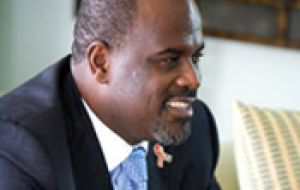MercoPress. South Atlantic News Agency
UK direct rule on Turks and Caicos Islands following corruption probe
 Former premier Galmo Williams described the UK government's actions as a “coup”.
Former premier Galmo Williams described the UK government's actions as a “coup”. The UK has imposed direct rule on the Turks and Caicos Islands after an inquiry found evidence of government corruption and incompetence. The administration of the UK Overseas Territory in the Caribbean has been suspended for up to two years and power transferred to the UK-appointed governor. Politicians are accused of selling crown land for personal gain.
Former premier Galmo Williams said he believed he could have worked with the UK government to resolve the problems.
The UK government has been threatening action for several months after an inquiry commissioned by the Foreign Office returned a damning verdict.
It examined the actions of the Turks' Cabinet and Assembly and found “information in abundance pointing to a high probability of systematic corruption or serious dishonesty”.
It also concluded there were “clear signs of political amorality and immaturity and of a general administrative incompetence”.
The former premier, Michael Misick, is alleged to have built up a multi-million dollar fortune since coming to power in 2003.
He resigned in March, but has denied the allegations and says he attracted valuable foreign investment to the islands.
The imposition of rule went ahead after a legal challenge by Mr Misick failed at the UK Court of Appeal earlier this week.
Foreign Office Minister Chris Bryant said the decision to impose direct rule had not been taken lightly, but he described the measures as “essential” to restore “good governance and sound financial management”.
“It remains our intentions that elections should be held by July 2011, if not sooner,” he said.
“The governor and his advisers have much to do, but I know that many people in Turks and Caicos Islands will welcome this move and have high expectations for the end outcome. ”I encourage them to work with the governor to rebuild stability and confidence in their territory.“
But Mr Williams, premier of the territory until direct rule was imposed, has described the UK government's actions as a ”coup“.
”A coup is anything that has been done without the will of the people and being a colony anything the British government wants to do to us they can do to us,“ he told the BBC.
He said he accepted the territory faced challenges, but argued that by imposing UK rule, the will of the islands' people had been ignored.
”We will never be able as a nation to move forward [if] every time we reach a crossroads our rights get taken away, our freedom gets taken away.“
He had told UK officials he and his administration were willing to work with the British government as a partner, he said.
”We have done that over the last five months - we have demonstrated that and we have made progress together.
“I believe if the opportunity presented itself we could have continued making progress.”
However, Gordon Wetherell, who took over as governor last year, said the UK's move did not amount to a “takeover”.
“Public services will continue to be run by people of the Turks and Caicos Islands, as indeed they should be, but I hope we can now begin to run them better,” he said.
“Our goal is to make a clean break from the mistakes of the past by establishing a durable path towards good governance, sound financial management and sustainable development.
”Our guiding principles will be those of transparency, accountability and responsibility. I believe that most people in the Turks and Caicos will join with me in welcoming these changes.”
Turks and Caicos is a UK overseas territory and residents there have British citizenship. It is a leading offshore financial centre where thousands of foreign companies are registered. The territory is also a popular tourist destination and has a population of about 30,000 and receives annually 200.000 tourists. Once a dependency of Jamaica, the islands become a crown colony when Jamaica gained its independence in 1962. (BBC)




Top Comments
Disclaimer & comment rulesCommenting for this story is now closed.
If you have a Facebook account, become a fan and comment on our Facebook Page!